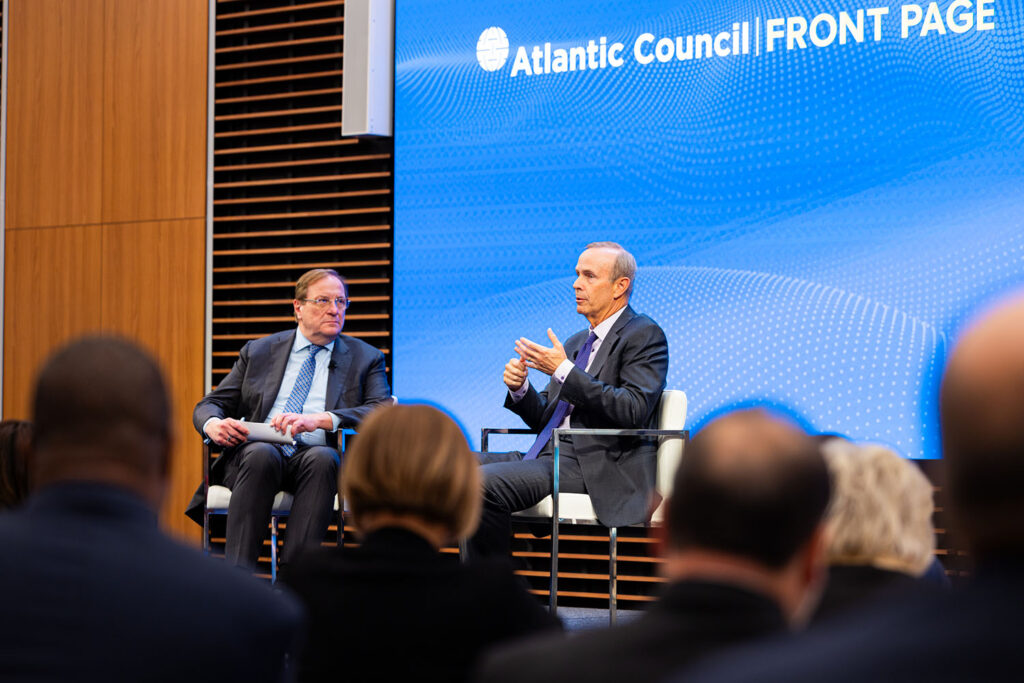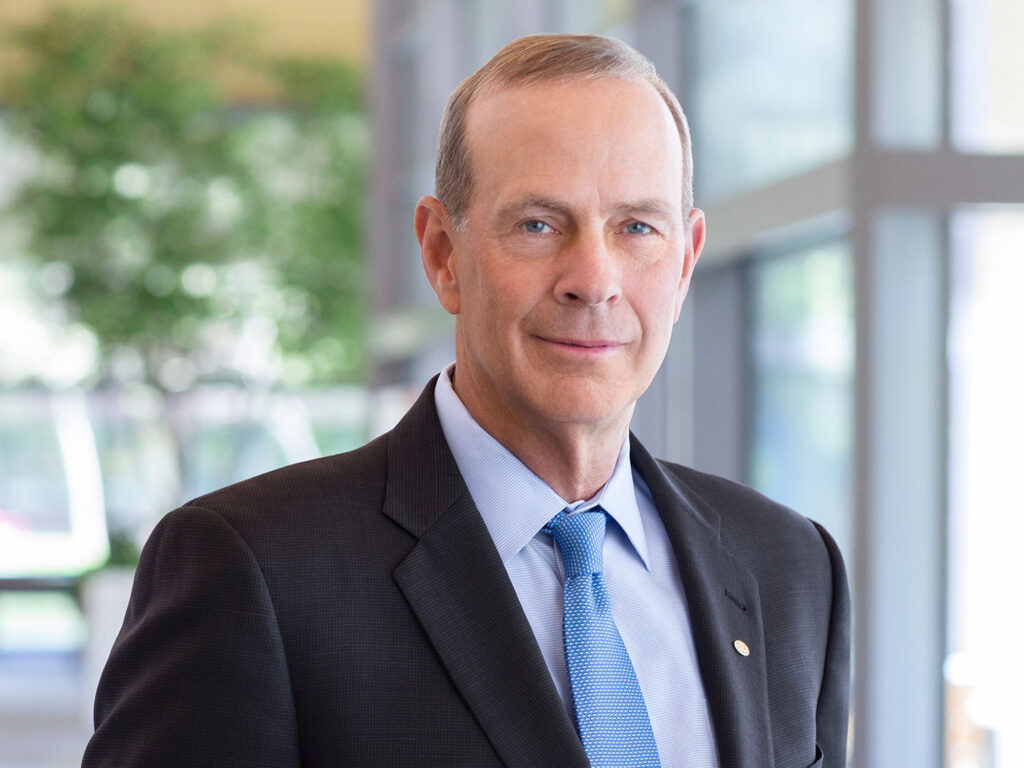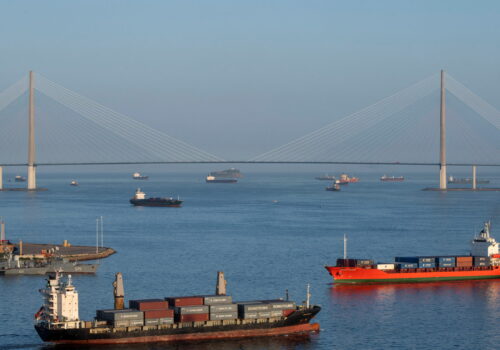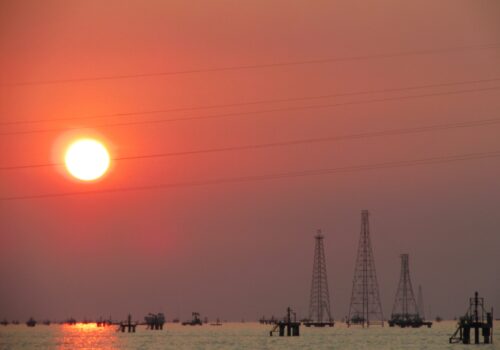Watch the full event
According to Chevron* Chief Executive Officer Mike Wirth, there’s a rising “recognition” that the energy transition is “going to take longer than people would have hoped a few years ago.”
At a December 6 Atlantic Council Front Page event, Wirth argued that building what is essentially “a separate energy system”—a zero-carbon energy system—“in parallel” is going to require new infrastructure and new investments. “That’s going to take time,” he said.
Wirth explained that while finding solutions for climate change is at the forefront of policy discussions in Europe and the United States, developing countries are more focused on solutions that enable energy access and affordability. But, Wirth said, there are no “one-size-fits-all solutions.”
“The reality is some of these solutions work better in some places than they do in others, and none of them serve all the different needs of a diverse economy,” Wirth said. He added that he thus appreciates the flexibility of the Paris Agreement, in allowing countries to make their own nationally determined contributions based on their own contexts.
With President-elect Donald Trump soon to reenter the White House, Wirth said that he expects to see continued growth in conventional energy and also in “new technologies that address future market demands.”
“The US is an energy superpower. We have a strong diverse energy economy, and it is fundamental to our economic competitiveness,” he said. “We need all of these solutions” to satisfy future demand for energy.
Below are more highlights from the conversation, moderated by Atlantic Council President and CEO Frederick Kempe, in which the Chevron head discussed the future of the energy system under a new US administration and the impacts of geopolitics on energy.
The four-year outlook
- Wirth said the next US administration needs to craft policies that “balance” between three “tradeoffs”: Mitigating environmental impact, ensuring access to affordable energy, and maintaining national security.
- Wirth said that he believes Trump understands “the importance of a strong energy economy for a strong US economy.” He added that he expects the Trump administration to “reduce the regulatory burden” that the energy industry faces, and that there will be continued growth and advancement in both renewables and conventional energy.
- The next administration may want to take a look at the United States’ sanctions on oil-producing countries Iran, Russia, and Venezuela, Wirth noted. “Enforcement of those sanctions has been designed to allow those barrels to continue to come into the market” in part to avoid spiking oil prices, he said.
- “They haven’t really crimped supply, they’ve just redirected supply,” he argued. And that, he added, has created “certain risks” as the countries that have been subject to sanctions have looked into other, more dangerous ways to sell and ship their energy. For example, Wirth explained, Russia has resorted to using a shadow fleet, which poses risks for other ships and the environment. “That’ll be another issue that the administration will grapple with,” Wirth said.
- Chevron is the only US oil company allowed to operate in Venezuela. Wirth said that while the company has not yet discussed this with the incoming Trump administration, Chevron wants to maintain its presence there. “Other companies have left Venezuela. They’ve been replaced by and large with companies from two countries: Russia and China,” Wirth said. “If we were to leave,” he added, there is “no doubt” Chevron’s operations would meet the same fate.
Energy and geopolitics: “Fundamentally intertwined”
- Wirth said that energy and geopolitics—including the conflicts unfolding around the world—are “fundamentally intertwined.”
- Considering Europe’s scramble to decrease its dependence on Russian gas following Russia’s 2022 invasion of Ukraine, Wirth argued that “Europe is going to have to reassess its overall approach to energy supply.”
- The United States, Wirth said, can be “an important source of supply to our allies” in Europe and beyond. “We’ll need to be in that future to avoid creating the same kind of single-point dependence that has existed.”
- On the conflict in the Middle East, Wirth said that Chevron has shut down natural gas platforms in the eastern Mediterranean. “These facilities have been targeted by rockets and missiles from Hezbollah,” he said. But, he added, “the naval version of the Iron Dome has proven to be effective in interdicting,” Wirth said.
- In discussing the technologies supporting the energy transition, Wirth warned that China has a “very strong hold” on the supply chains for materials—including rare earths and critical minerals—that make up technologies such as solar panels and electric vehicles.
- “You see a lot of the mining activity going on in Africa . . . and a lot of the processing goes on in China, which gives China a lot of influence over supply pricing,” he said. “We haven’t diversified the supply chains for some of these inputs to new energies nearly enough.”
Katherine Walla is the associate director of editorial at the Atlantic Council.
Note: Chevron is a donor to the Atlantic Council.
Watch the full event
Further reading
Fri, Dec 6, 2024
The threats posed by the global shadow fleet—and how to stop it
Report By Elisabeth Braw
Since 2022 the number of aging ships whose ownership, insurance status, and safety is unknown has exploded, prompted by Russia's reliance on this "dark fleet" to ship its oil in defiance of Western sanctions. What can be done about this environmental, economic, and safety threat on the high seas?
Fri, Dec 6, 2024
Ukraine faces its most perilous winter yet
EnergySource By Haley Nelson
Ukraine faces its harshest winter yet as temperatures drop, gas stocks dwindle, and its already crumbling energy infrastructure continues to endure Russian missile attacks. Ukraine, with help from its partners, must urgently strengthen defenses of its energy infrastructure, or they risk international financial support being undermined by the continuous onslaught.
Tue, Dec 3, 2024
There’s a more effective way forward than “maximum pressure” for Venezuela
EnergySource By
Following the fraudulent outcome of Venezuela's July election, there is growing pressure on the United States to reintroduce sanctions to expel Western firms from the nation’s oil sector. However, preserving the existing policy, which restricts the regime’s financial access while promoting energy security and countering foreign influence, might prove more effective.
Image: Chevron CEO Mike Wirth speaks at an Atlantic Council Front Page event on December 6, 2024.




